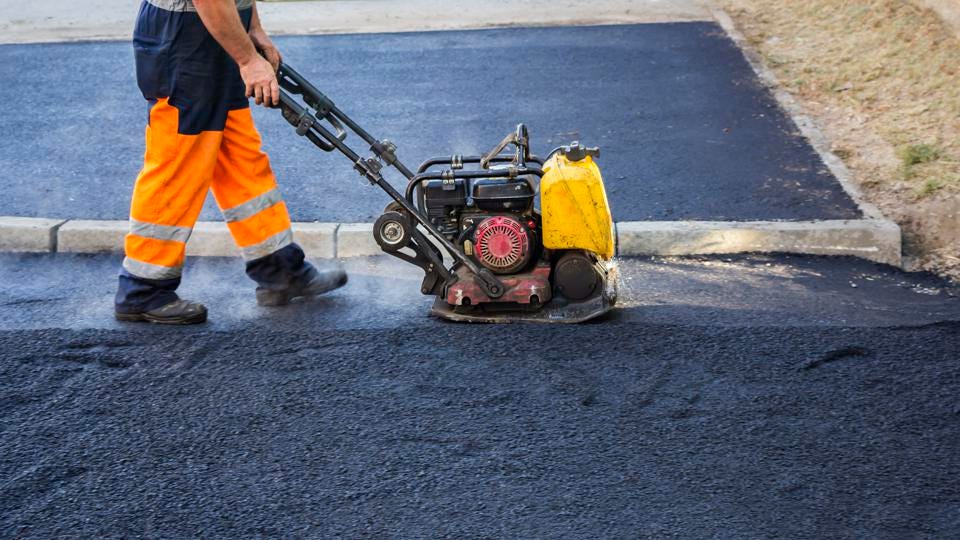Have you ever noticed large cracks in your asphalt pavement? If so, you’re probably dealing with alligator cracks, a common sight on many driveways and parking lots, making the environment look unsightly and even become dangerous if left unattended. But don’t let these menacing cracks ruin your pavement’s appearance. Instead, you can take steps to prevent them from occurring and repair them if they’ve already started.
In this blog post, we’ll cover everything you need to know about alligator cracks: what causes cracked asphalt, how to prevent their occurrence, and the best ways how to fix alligator cracks in asphalt. So keep reading for more information about keeping your asphalt looking its best.
Pave the Way to Success
Transform Your Understanding into Action. Check Out Our Premium Asphalt Pavers
Explore Asphalt Pavers Now!Identify the Cause of Alligator Cracks
Alligator cracks are a type of asphalt pavement failure that can occur for a variety of reasons, and here are some of them:
- Moisture in the pavement: Excess moisture can cause cracks to form due to the weakening of the pavement material.
- Poor draining or runoff conditions: If water cannot flow away from the pavement, it can seep into the surface and cause alligator cracks.
- Temperature changes: Extremely hot and cold temperatures can cause expansion and contraction of the asphalt, leading to cracking.
- Heavy loads: Vehicles with heavy loads can cause sinkage in the pavement, creating an uneven surface that causes alligator cracks.
- Poor construction: Incorrect installation methods or poor choice of materials can lead to premature deterioration and alligator cracking of asphalt pavements.
If you notice alligator cracks in your asphalt, it’s crucial to inspect the area to determine the underlying cause so that you can take steps to fix the problem.
Preparation
If you’re dealing with alligator cracks on your asphalt, you want to ensure it gets handled properly. Before proceeding with repairs, thoroughly clean the debris and loose materials area. Cleaning will help ensure that your repair lasts long into the future. Then you’re ready to start filling in any large potholes or depressions before you apply the material needed to restore your asphalt surfaces to their original condition. Taking these extra steps can ensure that your asphalt is left looking firm, flat, and safe when installation is complete.
Repair Methods
Alligator cracks are particularly stubborn among asphalt repairs, so don’t let them take control of your property – here’s how to fight back! The two main methods of repairing alligator cracks are patching and filling. Let’s discuss their differences.
- Patching – This method involves cutting out the area affected by alligator cracks and replacing it with new asphalt that blends nicely with your surface, restoring its smoothness and appearance.
- Filling – This involves applying a sealant or hot rubberized crack filler to the damaged area. This method prevents weeds and water from seeping below the surface and causing further damage.
Don’t let alligator cracks get you down. Instead, check out these repair methods and see how to restore your pavement to its original form.
Application Process
Patching
- Clean the damaged area to remove any dirt, debris, or oil.
- Cut out any loose pieces of asphalt and discard them.
- Use a hand tamper to compact the hole’s edges in the pavement.
- Spread asphalt patch material into the hole until it is filled and leveled with the surrounding pavement surface.
- Compact the patch using a hand tamper or a commercial roller compactor for more extensive repairs.
- Finish off by applying an asphalt coating over the patch to protect it from wear and tear due to weather and traffic conditions.
Filling
- Gather materials, including asphalt sealant, a trowel or putty knife, and plywood (for larger areas).
- Clean away all dirt, debris, and oil from the affected area before applying sealant with a trowel or putty knife in thin, even layers that overlap each other slightly along the edges so that there are no gaps between applications of the material.
- Use plywood to press hard into the area when covering large sections for a smooth finish with minimal air bubbles or holes for water infiltration that could cause further damage later on down the road if left unattended now.
- Allow time for sealant application to dry based on product instructions before driving over the patched area again and enjoying the newly repaired road surface!
Tips for achieving a smooth and even finish:
• Take your time when cleaning, measuring/cutting out pieces of asphalt/sealant, pressing sealants onto porous surfaces (which may require multiple layers) as well as smoothing these same applications for optimal results—rushing through any part of this process is likely to leave you with an uneven finish at best!
• When applying sealants pay special attention to making sure they don’t become too thin – otherwise, they won’t stick properly when drying, which can create weaknesses in your repair job!
• After finishing up but before allowing time for dryness, make sure all surfaces are free from dirt/debris that may have been transferred while working (to avoid contaminating the final result).
Meanwhile, following the manufacturer’s instructions is essential to repair alligator cracks properly. Different types of asphalt repairs using fillers and patching require different approaches and techniques. Failure to follow the manufacturer’s guidelines can lead to several problems, including an uneven finish, an improper seal between the repair area and surrounding pavement, water infiltration and potentially further damage, or even more expensive repairs.
Pave the Way to Success
Transform Your Understanding into Action. Check Out Our Premium Asphalt Pavers
Explore Asphalt Pavers Now!Prevention
Fortunately, there are preventative measures you can take to reduce your risk of alligator cracking in the future.
Regular maintenance inspections and repairs will go a long way in preserving your asphalt pavement. Be sure to look for loose or sunken patches that may indicate underlying issues with your asphalt and address them as soon as possible. Additionally, ensuring proper drainage around the asphalt is key to preventing alligator fractures from forming. Ensure that gutters, downspouts, and other drainage outlets are clear so that any standing water can flow away quickly and not pool around the edges of your pavement.
By following these simple steps, you can significantly reduce your risk of developing costly alligator cracks in the future and preserve your investment for years to come!
Conclusion
Alligator cracks, fatigue, or crocodile cracking are unsightly and potentially costly issues that plague asphalt surfaces. If left unaddressed, alligator cracks can quickly expand and become even more challenging to repair. It’s, therefore, important to immediately attend to any signs of alligator cracking to prevent further damage from occurring.
Are you looking for an expert to help you with your paving needs? Look no further than LeeBoy! Our top-notch asphalt and maintenance equipment is designed to meet all of our customers’ needs. Reach out to your local dealer today to find out more about our services.

